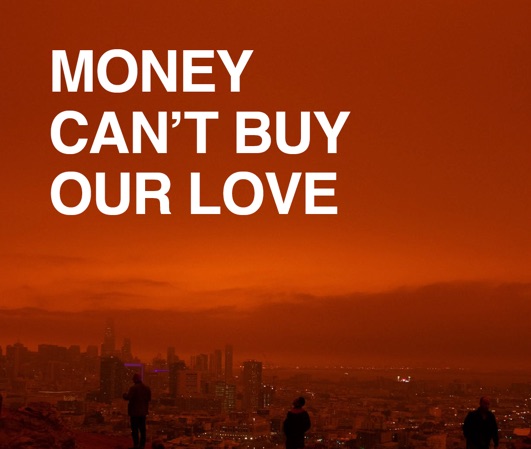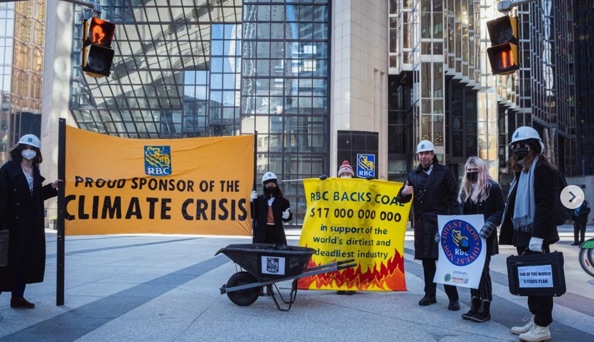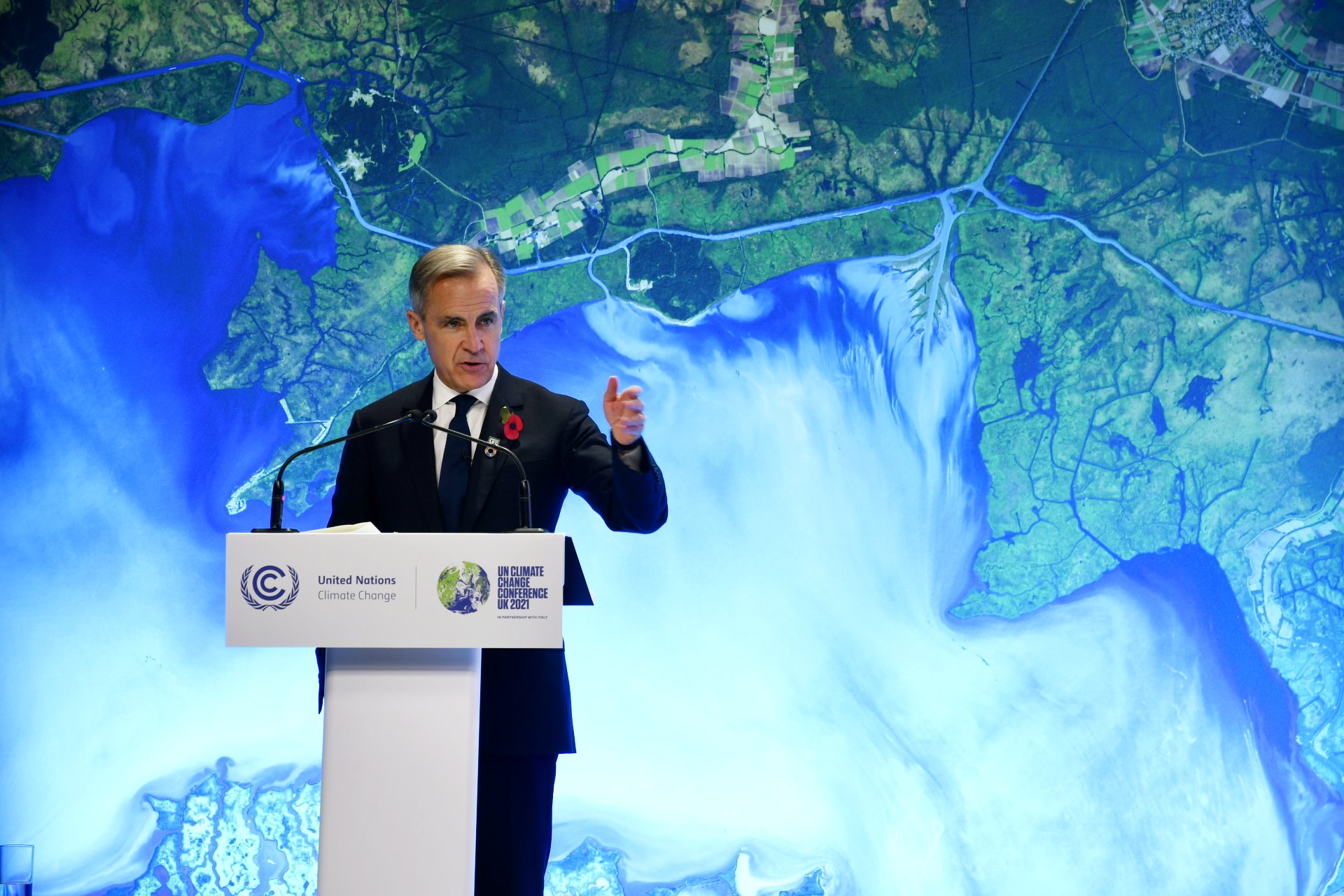
This week, Greenpeace Canada released the Money Can’t Buy Our Love report with the Canadian youth-led organization Banking on a Better Future. The report highlights marketing techniques used by the top five Canadian banks (RBC, TD, Scotiabank, BMO and CIBC) in philanthropic ventures to draw in young customers.
As reported in Toronto’s NOW Magazine:
Banks have long mounted impressive branding campaigns to highlight their support of arts and cultural organizations. Their logos and financial might are now increasing behind campaigns on university campuses and high schools.
But banks are profit-driven institutions, and while posing as philanthropists, their contributions also distract us from the very real harm these institutions cause through their financing of fossil fuel projects that pump climate chaos and violate Indigenous rights. Banks are putting their reputation at risk with youth by continuously betting on destructive fossil fuels.
The Royal Bank of Canada, for example, has a particularly well-crafted portfolio that emphasizes the interests of youth. It includes a $50 million per year Future Launch program and initiatives like Tech for Nature designed to encourage growth in the cleantech sector with the aim of “preserving the world’s greatest wealth: our natural ecosystem.”
Except, $50 million a year is a trickle compared to the $208 billion in RBC financing directed to new fossil fuel expansion projects since 2016, which earns it the title of Canada’s largest fossil fuel funder. The disparity is shocking.
Read the report published with Greenpeace here, or the full article at the NOW Magazine website.

Despite Canada’s commitment to phasing out thermal coal electricity within eight years, Canadian banks are continuing to lend and invest more than USD$100 billion (CAD$127.23 billion) to coal-related companies, including in Canada, according to a new report out of Germany that tracks investment information on thermal coal from 600 financial institutions worldwide.
The findings, from Urgewald, also show that RBC is one of Canada’s biggest backers of thermal coal, with almost USD$11 billion (CAD$14 billion) of lending and financing to coal related companies, and holding USD$6.5 billion (CAD$8.3 billion) in bonds and shares.
“While communities across Canada and around the world experience devastating climate impacts from fires to floods, Canada’s fossil banks continue to finance coal-related companies to the tune of roughly $100 billion. In 2022, RBC financing fossil fuels while spouting sustainability is like handing out cigarettes while warning about the dangers of smoking,” said Richard Brooks with Stand.earth. “From financing coal, the dirtiest fuel on the planet, to greenwashing attempts, to financing Coastal GasLink’s violence against Indigenous land defenders, RBC finds itself on the wrong side of history. Time for RBC to drop coal exposed companies and phase out financing of oil and gas.”
Urgewald’s findings show that RBC is the only financial institution in Canada to make the top three of both Canada rankings in lending and investing in coal related companies.
| Lending & Underwriting of Canadian banks to GCEL 2021, in million USD (2019-21) |
|
Loans |
Underwriting |
Total |
| Non-Canadian Companies |
USD 20,326
CAD 25861.68 |
USD 21,068
CAD 26805.76 |
USD 41,394
CAD 52667.45 |
| Canadian Companies |
USD 4,773
CAD 6072.90 |
USD 3,531
CAD 4492.65 |
USD 8,304
CAD 10565.55 |
| Coal Related Companies |
USD 2,969
CAD 3777.59 |
USD 2,097
CAD 2668.11 |
USD 5,066
CAD 6445.70 |
| Coal Related Companies – RBC |
USD 609
CAD 774.86 |
USD 444
CAD 564.92 |
USD 1,052
CAD 1338.51 |
|
Bond- and Shareholdings of Canadian investors to GCEL 2021, in million USD (Nov-21) |
|
Bondholding |
Shareholding |
Total |
| Non-Canadian Companies |
USD 7,473
CAD 9508.23 |
USD 31,354
CAD 39893.11 |
USD 38,827
CAD 49401.34 |
| Canadian Companies |
USD 2,371
CAD 3016.73 |
USD 9,509
CAD 12098.73 |
USD 11,880
CAD 15115.46 |
| Coal Related Companies |
USD 9,844
CAD 12524.96 |
USD 40,775
CAD 51879.87 |
USD 50,619
CAD 64404.83 |
| Coal Related Companies Developers – RBC |
USD 1,203
CAD 1530.63 |
USD 5,379
CAD 6843.94 |
USD 6,582
CAD 8374.57 |
The Global Coal Exit List is maintained by Urgewald. It is the most comprehensive list of coal related and coal exposed companies in the world and relied upon by more than 600 financial institutions to inform their financing and investment of energy sector companies. More info can be found at: https://coalexit.org/about-us
See more photos from this action at RBC’s Toronto headquarters here.

A new report out this week by a European NGO tracks how banks continue to fund the expansion of fossil fuels, even after signing onto Mark Carney’s high profile Net Zero Banking Alliance last year.
Why is this a problem? All of the climate science projections and even the International Energy Agency’s most recent energy analysis shows that the planet can afford no new fossil fuel expansion while keeping global warming to under 1.5 degrees C. The expansion simply must stop.
But banks are clearly not getting the memo. Kate Aranoff, writing in the New Republic this week, summarizes:
A new report from the U.K.-based charity ShareAction finds that 25 European NZBA members have provided at least $38 billion in financing to 50 of the most expansionary upstream oil and gas companies on earth. Half of that financing was provided by four of the founding signatories of the Alliance: Barclays, BNP Paribas, Deutsche Bank, and HSBC. Since the Paris Agreement was brokered in 2016, the European banks analyzed have furnished upstream oil and gas expanders with $400 billion, and they “show no signs of stopping”.
She goes on to report:
Just as European oil companies have been quicker to announce net-zero pledges than U.S. companies, European banks have generally been more forthcoming with climate commitments. But talk doesn’t always translate to action: Just five of the European banks analyzed have begun to restrict financing for oil and gas projects, while only one—La Banque Postale—has a defined phaseout plan, to exit the oil and gas sector by 2030.
Others have been more canny: Barclays, for instance, pledged to cut off financing for shale drilling in Europe and the U.K. but not the U.S. “It’s a trend with a lot of bank policies,” Shields said of the Barclays pledge. “They have great headlines to go out with, but once you drill down into the policies, you see these big exceptions. A huge number of those exceptions allow them to continue business as usual.”
While the report is focused on European banks, Canadian banks – who joined Carney’s Net Zero Banking Alliance all at once and right at the last minute before the Glasgow COP – are even worse at funding expansion. Expect new numbers from RBC and the rest of the dirty Canadian banks next month when the latest Banking on Climate Chaos figures are out.
Read the full article at the New Republic website.



